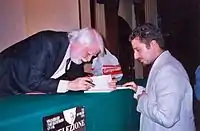Valentino Bellucci
Valentino Bellucci (1975 – 16 December 2021) was an Italian philosopher,[1] sociologist, poet, painter, and essayist.

Life and career
Bellucci was born in Weinheim, Baden-Württemberg, West Germany. He taught "History and critical analysis of the video-theater" at the Academy of Fine Arts in Macerata.[2][3][4] He was teacher of history and philosophy at the Italian high schools and cooperated with seminars at the University of Urbino.[5] After studying with the Orientalist Icilio Vecchiotti, he dedicated himself to the oriental culture, especially to the Vaishnava Bhakti tradition, exploring the epistemological, historical and psychological aspects. He devoted himself to an intensive information activity, concerning the philosophy and sociology, with his publications and conferences. As painter, he followed in particular the figurative school of Pietro Annigoni. Some of his works are displayed in some churches in the Marche region.[6][7][8] In 2003 he met Giovanni Raboni who rewarded him for a poetic composition.[9][10] His poems were recited by the actor Walter Maestosi.[11] He died from a heart attack on 16 December 2021, at the age of 46.[12]
Thought
Bellucci developed the existential themes of mysticism, both in the Western philosophical and religious tradition and in the Vaishnava Bhakti one; in the essay “Lo yoga devozionale indiano” (The Indian devotional yoga) he explains the social importance of the spirituality as existential journey rather than as institutionalized dogma. From a sociological point of view his analysis focused on the origins of the ancient Vedic culture; in his essay about Varna he shows how the ills of modern society derive from the break with the great traditional civilizations; therefore the historical and epistemological paradigms have to be rethought in the light of the ancient wisdom.[13][14] Furthermore, he investigated the origins of Christianity, inspired by the work of Mario Canciani, identifying lost lifestyles and teachings.[15][16] Bellucci proposed a critical recovery of ancient civilizations whose knowledges have a considerable social and individual value. His historical and sociological analyses led him to consider modernity as a mystification, a kind of collective self-deception that the society cultivates since the atheist and materialist Enlightenment; this mystification derives from an a priori rejection of the sacred, the divine, in order to follow the idols of technic and advanced capitalism. In this sense his investigation continued following in the footsteps of scholars as Jean Servier and Marcel de Corte.[17][18][19]
Works
- Il pensiero estremo. Saggi sui filosofi contemporanei, Tabula Fati, 2004.
- Dialogo su George Bataille, Nuova Corrente, Tilgher, Genova 2004, n.133, pp. 55–65.
- Walter Benjamin. La duplice genealogia del simbolo e della verità, Ghibli, 2004.
- Tutt'altro che animale. Riflessioni da Merleau-Ponty a Derrida, sui rapporti tra umanità e animalità, Studi urbinati, Urbino 2006
- Lo yoga devozionale indiano. Il vaishnavismo, Xenia, 2011.
- Il benessere attraverso l'Ayurveda, Editoriale Programma, 2013.
- Cristo era vegetariano?, Editoriale Programma, 2013.
- Godot è arrivato. Conferenze, interventi e note critiche, Petite Plaisance, 2014.
- Il Sutra del naufrago. Aforismi e note di un osservatore di fronte al crollo del mondo moderno, Petite Plaisance, 2014.
- Le strutture sociali del varnāshrama-dharma. Saggio sull'origine delle caste indiane e sui paradigmi delle società tradizionali, Solfanelli 2014.
- L'estasi e le pietre, Lepisma, 2015.
- L'invenzione dell'inferno, Harmakis, 2015.
- La Chiesa di Darwin, Harmakis, 2015.
- The Church of Darwin : Dogmas of evolution and scientists that criticize it, Harmakis, 2016
- Miti e misteri dell'Emilia Romagna, coautrice Gabriella Chmet, Editoriale Programma, 2016
- Che cos'è il Karma, Harmakis, 2016
- Da Pitagora a Guerre stellari. Il sapere esoterico dei veri illuminati, Petite Plaisance, 2016
- Hulk si innamora, Giovane Holden, 2019
References
- "Blog | Popsophia, da Pitagora a Guerre Stellari". 14 July 2016.
- Valentino Bellucci (2005). Artaud, Van Gogh e le immagini divoranti. Testo della conferenza tenuta all'Accademia delle Belle Arti di Macerata il 18 May 2005.
- http://www.delleali.it/…/Artaud_VanGogh_e_le_immagini_divor…
- Giordano Bruno Guerri cita i suoi scritti su Van Gogh nella sua opera, Follia? Vita di Vincent Van Gogh, Bompiani, Milano 2011, p.102
- Valentino Bellucci, Riflessioni, da Merleau-Ponty a Derrida, sui rapporti tra umanità e animalità, in Studi urbinati: Scienze umane e sociali, vol. 76.
- 1) Personale ad Urbino, sala Paolini Nezzo, 1999 ( Resto del Carlino, 25/2/99) 2) Personale a Montegridolfo, Castello, 1999 3) personale a Fano, 2002. (Il messaggero, 19/aprile/2002) 4) Personale a Fano, 2014, a cura di Gilberto Grilli, (Il resto del Carlino, 17/aprile/2014: "..l'artista è anche docente, scrittore, poeta e sociologo. La mostra, curata e presentata da Gilberto Grilli..."
- Valentino Bellucci, L'odissea del volto, in Pietro Annigoni a Pontassieve, Catalogo della Mostra, 2011, p. 13.
- Paolo Biagetti, Resto del Carlino, 31 May 2009, Casavino, i colori dello spirito
- the critic noticed in his style “a 'Flemish' chiaroscuro, conferring to his elegiac momentum figurative certainty "Giovanni Raboni, in Introduzione, Premio De Palchi-Raiziss, West press Editrice, Verona 2003, p. 5.
- (DE) LYRIKwelt - das LiteraturPortal im Internet!, su www.lyrikwelt.de.
- V. Bellucci, recital poesie, lette da Walter Maestosi, youtube.com.
- "Malore fatale a 46 anni Addio al professor Bellucci". Il Resto del Carlino. Retrieved 17 December 2021.
- Valentino Bellucci, Le strutture sociali del varnāshrama-dharma. Saggio sull'origine delle caste indiane e sui paradigmi delle società tradizionali, Solfanelli, 2014.
- Valentino Bellucci, Che cos'è il Karma, Harmakis, 2016
- Valentino Bellucci, Cristo era vegetariano?, Editoriale Programma, 2013.
- Nell'Arca di Noè di Mons. Mario Canciani - Introduzione, cattolicivegetariani.it.
- Valentino Bellucci, Il Sutra del naufrago. Aforismi e note di un osservatore di fronte al crollo del mondo moderno, Petite Plaisance, 2014.
- Il Prof. Luigi Alfieri nella prefazione del libro Le strutture sociali del varnāshrama-dharma...pag. 7 scrive " il libro, in particolare, dice cose importanti su come dai varna vedico si sia passati al 'sistema indù delle caste'. Che non esiste, o meglio esiste come fraintendimento classificatorio di stampo positivistico e insieme come cinica prassi coloniale..."
- Adriano Ercolani, La ricerca eretica di Valentino Bellucci